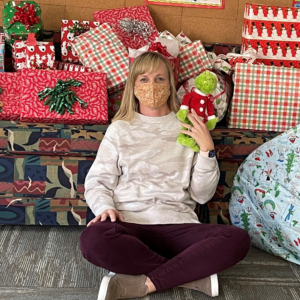This Advent season, we are joyfully able to bring back some of our favorite children’s ministry traditions, including making Advent wreaths, decorating the gingerbread church, and our family Christmas Eve Nativity service. Some of them have had to be modified a little, but I have, quite frankly, found myself a bit emotional at times while preparing and planning for these events.
Especially at this time of year, traditions seem so important and fulfilling. What is it about traditions that make them seem so significant?
Well, the word “tradition” comes from the Latin word “trader” which means “to transmit, hand over, or give for safekeeping.” Traditions are further defined as “regular behaviors or actions that we engage in over and over again at the same time and often in the same way.” They occur in a particular group (such as a family or congregation) and are often passed down through many generations. Traditions differ from routines in that we engage with traditions consciously and purposefully. We, in fact, become emotionally invested in traditions and feel off kilter when we are unable to experience them (such as during a global pandemic in 2020!).
In 2017, the IPSOS MORI Global Trends Survey interviewed 18,000 people in 23 countries regarding the importance of traditions. They reported that 80% of people interviewed agreed that “traditions are an important part of society.” Furthermore, in all but one country (Japan), participants reported that this sentiment was increasing.
As the old saying goes, “absence makes the heart grow fonder.” Last year, when many of our beloved traditions were not possible, we grew even more invested in them through the realization that their absence made us feel incomplete.
Saul Levine, M.D. and professor Emeritus in Psychology at the university of California San Diego proposes that traditions are so deeply crucial because they provide us with the four B’s:
- Being – Traditions help us to form our core identity, whether that is within a family, a community group, or a larger culture.
- Belonging – They make us feel part of a larger group with shared values and common practices.
- Believing – Traditions fulfill our need to believe in a system of morals and ethics (whether based on religious or secular principles).
- Benevolence – They help to fulfill our predisposition to be helpful to and enhance the lives of others.
In short, traditions help to form our identity, build connections across groups and through generations. They help us to feel part of something bigger and offer us a sense of comfort and belonging.
Mahatma Gandhi offers a word of caution, though, saying “It is good to swim in the waters of tradition, but to sink in them is suicide.”
Because we do get so emotionally tied to our beloved traditions, we often have a hard time changing them or giving them up, even when the same old things we’ve always done aren’t possible or aren’t working anymore. Then, we end up sinking.
In the wake of COVID, we have had to learn to be flexible and adjust in many facets of our lives whether we like it or not. We’ve had to be creative and re-invent or modify some of the traditions we love. In doing so, we have even discovered some better ways to do them! And, really, they have been just as rewarding and fulfilling as ever – maybe even more so.
As we continue to move through this Advent season and into a new year, I encourage you to think about the traditions you hold dear within your home or family and within our FPC community. Which ones are still serving you/us? How can we modify some of them to be safer, more current, or more inclusive? And, the hardest one – which ones might it be time to let go of?
A prayer for the season of traditions:
Loving God, during this Advent season, we thank you for the ways you reveal yourself and bring us closer to one another through time honored traditions. We thank you for the people in our lives who have handed down these traditions over time and we remember with love those who are no longer with us on earth. Lord, comfort us as we grieve traditions that have been lost. Give us courage and wisdom to create new ones. As we await the coming of the Christ child, open our eyes and our hearts to see you and worship you in new ways, whether it is through age old traditions or in brand new experiences. Amen.

